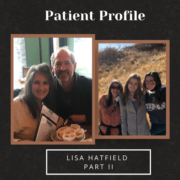Patient Profile: Lisa Hatfield Part II
This is Part Two in a five-part series from empowered multiple myeloma patient Lisa Hatfield (read Part I of Lisa’s story here). In Lisa’s candid and compelling telling of her cancer journey, she shares her story from diagnosis in 2018 to how she lives well with cancer in 2021. Lisa provides thoughtful feedback about becoming an empowered patient and the value of Patient Empowerment Network (PEN) as a resource, and she uses her experience to offer her advice to anyone newly diagnosed with cancer: Learn, Breathe, Feel, Share, Live, Connect, and Hope. In Part Two Lisa emphasizes the importance of being an informed patient and discusses how she values the power of PEN.
Education is critical to anyone diagnosed with cancer. A cancer diagnosis is overwhelming; it’s okay to ask for help. Having an advocate, whether it’s the patient or another person, can change everything from treatments to outcome. As an example, we quickly learned that our local oncology community does not include a myeloma specialist. Seek an expert opinion. For myeloma, hematologists are well-qualified, but a myeloma specialist is top-notch. We researched, asked around, and discovered several centers with myeloma departments. Fortunately, we scheduled quickly and summoned the resources to travel. Like us, many patients do not live near a specialty center for their type of cancer. Financial resources, and logistical resources, such as finding care for children, pets, house, etc., can be daunting to consider. Friends and family want to help. Accept the help. Educating yourself, or having another conduct research on your behalf, can change your prognosis and outcome…and your outlook. It changed mine. My overall survival (a.k.a. lifespan) potentially increased from two to four years to eight to ten years, based on access to newer treatments and information from my myeloma specialist. Education empowers and boosts hope.
Cancer is hard. Treatment can be harder. Understanding your treatments and their accompanying side effects is critical. Living with pesky, sometimes debilitating, side effects is a significant burden to carry.
In addition to asking questions of your provider, consider participating in a support/education group that includes members with your same or a similar diagnosis. We belong to a local myeloma group and meet monthly with others battling myeloma and their family members. Relief from severe, drug-induced muscle spasms is the result of after-meeting conversations with a fellow “myeloman.” I’ve learned as much from them as I have from my care team. And we’ve made lifelong friends.
Lastly, take advantage of steroid-induced insomnia and spend sleepless nights perusing the internet, but be thoughtful with your sources. Forums, blogs, articles, clinical trials, medical journals, and testimonials are at your fingertips. I enjoyed searching clinical trials and peer-reviewed medical journal articles while on high-dose steroids, in the wee hours of the morning. Now, I prefer bedtime reading of blogs and patient forums, particularly those with inspirational accounts in the midst of adversity. The supply seems endless, from general cancer topics to specific.
Patient Empowerment Network (PEN) and other cancer-related websites have helped me achieve a better outcome by publishing information specific to my diagnosis. The articles provide basic information for the newly diagnosed and identify a methodical approach to dealing with myeloma, including how to access treatment and important information regarding treatment decisions. The staging of myeloma includes “risk categories” for different genetic mutations. Prior to treatment at MD Anderson, my risk category had not been addressed, and I only knew to ask about it from a cancer website. Identifying the risk category is important when determining the appropriate chemo regimen. My regimen changed once my risk category was assigned, and I believe that my good outcome (remission) is a result of having this knowledge and addressing it with my specialist.
PEN also publishes patient testimonials. I find these stories inspiring and comforting. I’ve also identified, with my doctor in Houston, new drugs to try at relapse (myeloma patients anticipate relapse and often work with the specialist to determine the next round of chemo) from patient stories. Knowing we are not alone and having a common bond, eases stress and fear. Alleviating some of the negative emotion surrounding diagnosis helps with overall well-being, and hopefully improves outcome.
Read Part III of Lisa’s story here.










